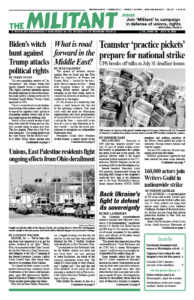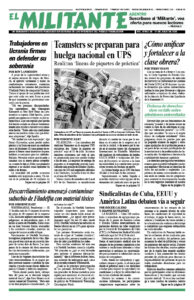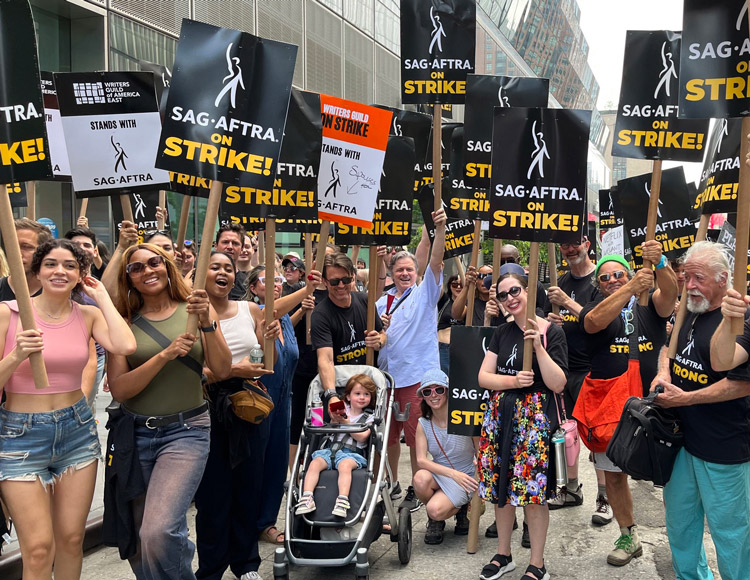LOS ANGELES — A spirited picket of 300 actors and writers carried signs and chanted outside Netflix’s office here July 17. Daily protests are being held outside major studios across Southern California, the heart of the movie industry. Actions are also being held outside production facilities in New York and across the country.
Some 160,000 members of the Screen Actors Guild-American Federation of Television and Radio Artists went on strike July 13 after a breakdown in negotiations with the Alliance of Motion Picture and Television Producers.
They joined more than 11,000 members of the Writers Guild of America, who have been on strike since May 2.
SAG-AFTRA represents actors and other performers in what is in fact a hardscrabble industry. For every performer who has been successful there are hundreds driving cabs, waiting tables or trying to hold down some other job to make ends meet. The union members are striking for higher minimum pay; increased residuals (a complex system that pays actors and writers for repeat showings of movies, televisions shows, commercials and other productions); and revenue sharing for the increasing percentage of streamed entertainment.
They’re demanding protections against the use of “artificial intelligence” to simulate background actors or extras. Increasingly, when a producer gets a picture of an extra’s face on the set, they then use it repeatedly instead of hiring the actor for subsequent performances.
“If we don’t stand tall right now, we are all going to be in trouble,” union President Fran Drescher said announcing the strike. “We are all going to be in jeopardy of being replaced by machines and big business.”
“They want me to work one day, pay me one day’s pay, scan my face and then they own it and use it without paying me,” a young woman who has worked seven years as an actor told the Militant at the picket in front of Netflix.
Her friend, who has been a member of SAG-AFTRA since 2011, explained if you say no to being scanned they don’t want to hire you. “And we don’t get any health care. We have to make so much a year to be eligible for the union’s plan. Eighty percent of us can’t get it. Why can’t this be our daily job? The producers aren’t in it to make a good movie. They’re in it to make money.”
Writers have made similar demands, saying that since the rise of streaming, mid-level writers have struggled to make a living wage.
Eric Edelstein still collects checks from cable reruns of the 2015 film “Jurassic World,” in which he had a small role as a caretaker for the dinosaurs. In a recent quarter, he said, his cable residuals for showing the movie totaled $1,400. By comparison, he received only $40 for reruns on streaming platforms.
And companies like Netflix don’t show reruns, their content is always available on their website.
Constantin Sieve, who came to Los Angeles from Germany, told the Militant he had just finished school for dramatic arts. “I look to the future and being part of a union. It’s important for workers and the community not to be exploited by the companies.
“What astonished me is that unions aren’t mandatory like in Germany where I’m from,” he said. “It makes the relationship between workers and companies worse. The consequences of fighting for a union in the U.S. is you have a target on your back. It’s risky. So since there is a union here we should keep fighting and supporting it. We already have the union so we have to fight to keep it.
“The work is project to project,” he added. “If you’re regular on a series people expect you to be rich, but it’s not true.” Like the writers, actors work job to job.
If you earn $25,950 in covered earnings or work 100 days in the industry within a one-year span, you can qualify for the SAG-AFTRA Health Plan. Estimates are that 75% to 90% of members are not able to reach this threshold.
SAG-AFTRA and Writers Guild strikers have been joined on picket lines by workers in other industries fighting for contracts that can sustain them and their families, like hotel workers here organized by UNITE HERE, Teamsters at UPS and others. This unity has helped boost the spirit and confidence of workers in all these fights.


